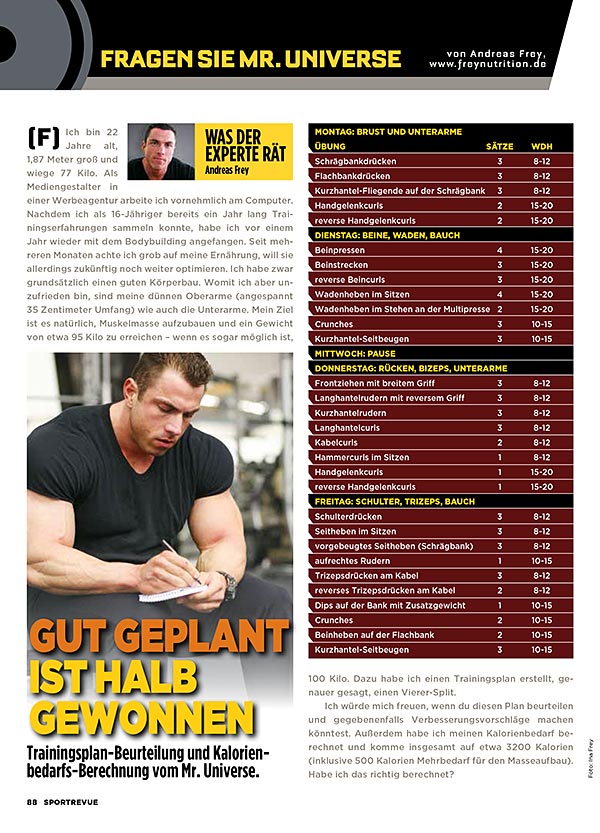ANSWER
!
your training plan is well worked out, the muscle groups are divided up sensibly. As I generally recommend, you do a maximum of ten sets for large muscle groups and a maximum of six sets for small muscle groups. This not only saves you training time, but also gives your body more time to recover. You might want to consider swapping the units on Thursday and Friday. This would give your shoulders and triceps an extra day to recover before they are stressed again - albeit indirectly - on Monday with the chest training.

Always make sure that you do not exceed 60 minutes of training and rest one and a half to two minutes between sets. Work to muscle failure in each set. Perform each repetition in a controlled and clean manner; cheating should only be used in special intensity techniques and only in exceptional cases. To put even more strain on the muscles, place emphasis on the negative contraction in each repetition: one to two seconds for the positive movement and three to four seconds for the negative movement.
CALORIE REQUIREMENTS
Your daily basal metabolic rate (calorie consumption at rest) is calculated as follows:
77 kilos body weight x 24 hours = 1848 kilocalories
To calculate your daily calorie consumption at normal levels of exertion, we have to take into account the energy expenditure of your daily work and training as well as digestive loss. Working at a desk in front of a computer does not use up much energy. For this reason, we use a PAL value (= Physical Activity Level) of 1.2 for the calculation. A value of 0.1 is estimated for a 60-minute workout, and the same applies to digestive loss. Four hours of training per week corresponds to a value of 0.06 per day (4 x 0.1 : 7). This results in the following formula:
1838 kilocalories x (1.2 + 0.1 + 0.06) = 2500 kilocalories
In order to gain muscle mass, the daily calorie consumption should be exceeded by at least 500 kilocalories, which would correspond to 3000 kilocalories. So you are absolutely right with the 3200 kilocalories you calculated. However, it is not just the amount of daily calories that is important, but also the distribution of proteins, carbohydrates and fats. I recommend the following distribution of macronutrients:
- 2.8 g protein per kilo body weight per day = 216 g = 886 Kcal
- 5.0 g carbohydrates per kilo body weight per day = 385 g = 1579 Kcal
- 1.0 g fat per kilo body weight per day = 77 g = 716 Kcal
As long as you are gaining weight consistently, you should stick to this plan. If you reach a point where your weight gain stagnates for more than a week, your body may need more calories to continue gaining weight - i.e. muscle mass.
In such a case, you should increase your total calories by another 300 to 500 calories per day. You should divide these into 50% carbohydrates and 50% proteins. After that, nothing should stand in the way of further weight gain. If you want to increase muscle mass even further, I recommend the USE OF CREATINE MONOHYDRATE , which is scientifically proven to play a significant role in muscle building.

Send us your question!
SEND US YOUR QUESTION!
Do you have any questions about bodybuilding, nutrition, training or supplements? Then send us your question by email to:
INFO@FREYNUTRITION.DE
This will then be answered personally by Andreas Frey in the form of a column and published here!













